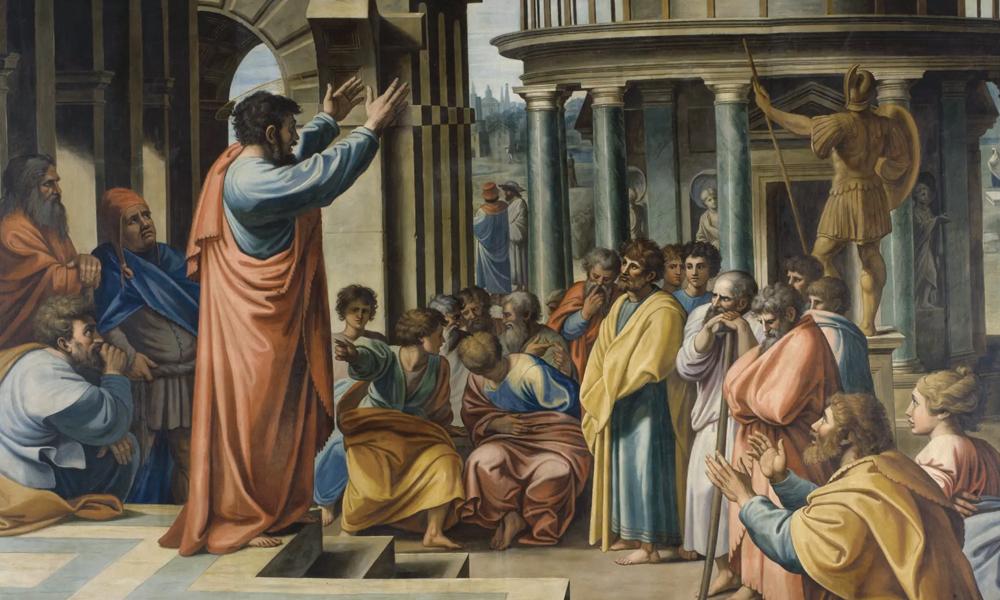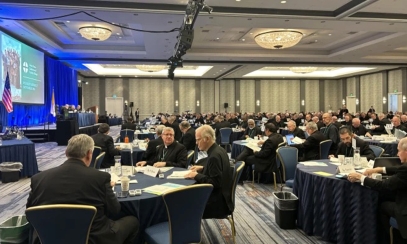
We Were Born for ‘Such a Time as This’
Are we living in Christendom or apostolic times? And do you know the difference? In 1974, Archbishop Fulton Sheen said, “... we are at the end of Christendom.” What is Christendom, you might ask? Christendom is defined as a time when our society – culture, family, business, politics, education and more – is deeply influenced by Christianity. This is not to say that all the people are Christian, rather that the Christian lens (our morals and values) is deeply imbedded in all those areas mentioned above.
Are we living in Christendom or apostolic times? And do you know the difference? In 1974, Archbishop Fulton Sheen said, “... we are at the end of Christendom.” What is Christendom, you might ask? Christendom is defined as a time when our society – culture, family, business, politics, education and more – is deeply influenced by Christianity. This is not to say that all the people are Christian, rather that the Christian lens (our morals and values) is deeply imbedded in all those areas mentioned above.
Archbishop Sheen went on to explain, “Christendom is economic, political, social life as inspired by Christian principles. That is ending — we’ve seen it die. Look at the symptoms: the breakup of the family, divorce, abortion, immorality, general dishonesty.” That was nearly 50 years ago. And if we are honest with ourselves, the symptoms are even worse today. We can add mass shootings, drug and alcohol addiction, suicide and political polarization, among other things, to the list.
Marginalizing God
In our culture today, the modern mindset marginalizes God as only an actor in human history. This can be expressed in an explicitly atheistic view, but oftentimes it is not. The modern vision does not say “God does not exist,” but rather, “God doesn’t really matter.” In reality this is saying the same thing, isn’t it? If “God doesn’t really matter,” one can see why we are no longer living in Christendom times. Judeo-Christian values used to be the lens for a Christendom worldview. Not so any more. The American vision as a whole used to be friendly toward Christianity, but as we have seen in recent times, that is rapidly disintegrating.
Throughout history, it has been a struggle to maintain and deepen the influence in Christian institutions of society. “Christianity is not natural to a fallen world, and there are many forces, both human and spiritual, constantly at work to undermine and overthrow the influence of Christ upon humanity, individually and collectively.” Society may embrace Christian elements and call itself Christian, even while rejecting the heart of the Gospel.
In Christendom, believers are fundamentally at peace with their faith and the practice of it. It leads them to living peacefully, worshiping freely, supporting institutions that honor Christ, but the reality of the presence of evil (especially in their own lives) is kept at bay, and the spiritual reality (something beyond this earthly world) gets lost or out of focus. Faith can be merely reduced to visible expressions. But in reality, as we know, professing Christianity and living the Faith in a radical way as the Gospel of Jesus demands are two different things.
Living in apostolic times
In Christendom times, the Church can be just one of many cultural institutions that enrich human life, rather than as the recreated human race saved from death and slavery by the suffering, death and resurrection of Jesus Christ.
In the view of Archbishop Sheen, “The Church is not a continuing thing — it dies and rises again. It proceeds on the principle of Christ himself as priest and victim. And there comes the defeat, the seeming decay, we are put in the grave, and then we rise again. We have had four deaths in our Christian history.”
Since this has been happening throughout history, we should not be discouraged. We should not despair. Like the first disciples, we are living in exciting times, apostolic times.
“In an apostolic situation, because the Church is not the major influence in the society’s overarching vision, the need is not mainly for maintenance, though this comes into play; it is rather for apostolic witness and the building of a distinctly Christian cultural vision and way of life. In such a time the Church understands herself to be vastly different from the world around her, needing to make her way against hostility or apathy, unable to count on the wider society to sustain her institutions or carry her vision to life.”
Sharing the Good News in new ways
It is all about finding new ways to share the Good News of Jesus Christ in a culture that has gone astray. We do this by re-acquiring a Biblical worldview, by sharing the vision of the Gospel much the way it was done by the early apostles. The birth of Christianity came from the Resurrection of Jesus and the outpouring of the Holy Spirit at Pentecost. And the apostles, all 11 of them, were sent out with this mission and this mission alone: “Go and make disciples of all nations.” In other words, to bring the Gospel of Christ to the whole world.
Filled with the gift of the Holy Spirit— that very same Spirit that has been given to you and me in Baptism and strengthened in Confirmation— the apostles and a few disciples went forth in faith and trust, with great hope. They had no Christian institutions of a Christendom time as resources. They could have been completely overwhelmed by discouragement, facing crisis in every direction and even martyrdom. But they were not discouraged. They were filled with joy and hope. Most importantly, they had great confidence in the Lord Jesus, their message and the creativity and fruitfulness of the early Church. They knew that their task was to avail themselves to be used by the Holy Spirit to grow the Church, and they knew the power of the Lord’s grace to make it grow.
Confidence in Christ
A Church in apostolic times must have this same confidence in the power and beauty of the message of Jesus Christ – the Good News – that God in his love and mercy has come among us to set us free from our sins and from slavery to the devil, and for those who turn their lives completely to him, “the nightmare of life apart from God can be transformed into a dawn of eternal life.”
If God came into a darkened world as one of us in Christ Jesus, and has set us free from our sins and from slavery to the devil, why is the world still so dark for so many? I would dare to say that for many Christians, church-going people included, this personal experience of the Good News has not yet happened. The love and mercy of Jesus Christ is a mere concept and not a reality that has transformed them, given them a new identity, and sent them on personal mission.
‘Where sin abounds, grace abounds all the more’
A world without God, a life without this experience, is a desolate wasteland. But a new life in Christ transforms this wasteland into a world or culture we can’t yet imagine.
The Holy Spirit is at work in every age, including this one. We can be assured of the words of St. Paul, that in Christ Jesus, where sin abounds, grace abounds all the more (Rom. 5), and thus be confident that abundant action of the Holy Spirit is present on our own time. You and I, all of us, must “seize the adventure of cooperating with him” in our present age. “May we be given the wisdom and the courage to rise to the challenge of the new apostolic age that is coming upon us and to prove faithful stewards in our generation of the saving message and liberating life given us by Christ Jesus.”
The Most Rev. Robert D. Gruss is the seventh bishop of the Catholic Diocese of Saginaw.



